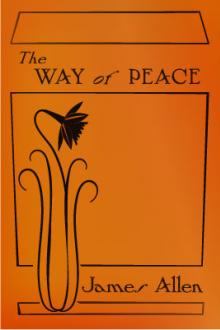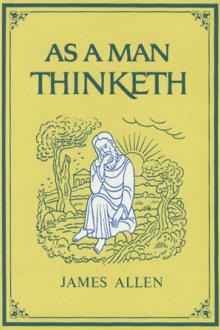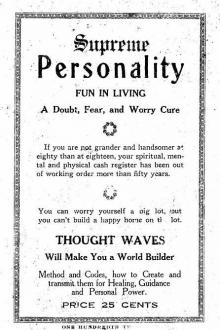The Way of Peace by James Allen (historical books to read .txt) 📕

- Author: James Allen
- Performer: -
Book online «The Way of Peace by James Allen (historical books to read .txt) 📕». Author James Allen
O Indian Prince! of him whose feet are set
On that fair path which leads to heavenly birth!"
When men, lost in the devious ways of error and self, have forgotten the "heavenly birth," the state of holiness and Truth, they set up artificial standards by which to judge one another, and make acceptance of, and adherence to, their own particular theology, the test of Truth; and so men are divided one against another, and there is ceaseless enmity and strife, and unending sorrow and suffering.
Reader, do you seek to realize the birth into Truth? There is only one way: Let self die. All those lusts, appetites, desires, opinions, limited conceptions and prejudices to which you have hitherto so tenaciously clung, let them fall from you. Let them no longer hold you in bondage, and Truth will be yours. Cease to look upon your own religion as superior to all others, and strive humbly to learn the supreme lesson of charity. No longer cling to the idea, so productive of strife and sorrow, that the Savior whom you worship is the only Savior, and that the Savior whom your brother worships with equal sincerity and ardor, is an impostor; but seek diligently the path of holiness, and then you will realize that every holy man is a savior of mankind.
The giving up of self is not merely the renunciation of outward things. It consists of the renunciation of the inward sin, the inward error. Not by giving up vain clothing; not by relinquishing riches; not by abstaining from certain foods; not by speaking smooth words; not by merely doing these things is the Truth found; but by giving up the spirit of vanity; by relinquishing the desire for riches; by abstaining from the lust of self-indulgence; by giving up all hatred, strife, condemnation, and self-seeking, and becoming gentle and pure at heart; by doing these things is the Truth found. To do the former, and not to do the latter, is pharisaism and hypocrisy, whereas the latter includes the former. You may renounce the outward world, and isolate yourself in a cave or in the depths of a forest, but you will take all your selfishness with you, and unless you renounce that, great indeed will be your wretchedness and deep your delusion. You may remain just where you are, performing all your duties, and yet renounce the world, the inward enemy. To be in the world and yet not of the world is the highest perfection, the most blessed peace, is to achieve the greatest victory. The renunciation of self is the way of Truth, therefore,
"Enter the Path; there is no grief like hate,
No pain like passion, no deceit like sense;
Enter the Path; far hath he gone whose foot
Treads down one fond offense."
As you succeed in overcoming self you will begin to see things in their right relations. He who is swayed by any passion, prejudice, like or dislike, adjusts everything to that particular bias, and sees only his own delusions. He who is absolutely free from all passion, prejudice, preference, and partiality, sees himself as he is; sees others as they are; sees all things in their proper proportions and right relations. Having nothing to attack, nothing to defend, nothing to conceal, and no interests to guard, he is at peace. He has realized the profound simplicity of Truth, for this unbiased, tranquil, blessed state of mind and heart is the state of Truth. He who attains to it dwells with the angels, and sits at the footstool of the Supreme. Knowing the Great Law; knowing the origin of sorrow; knowing the secret of suffering; knowing the way of emancipation in Truth, how can such a one engage in strife or condemnation; for though he knows that the blind, self-seeking world, surrounded with the clouds of its own illusions, and enveloped in the darkness of error and self, cannot perceive the steadfast Light of Truth, and is utterly incapable of comprehending the profound simplicity of the heart that has died, or is dying, to self, yet he also knows that when the suffering ages have piled up mountains of sorrow, the crushed and burdened soul of the world will fly to its final refuge, and that when the ages are completed, every prodigal will come back to the fold of Truth. And so he dwells in goodwill toward all, and regards all with that tender compassion which a father bestows upon his wayward children.
Men cannot understand Truth because they cling to self, because they believe in and love self, because they believe self to be the only reality, whereas it is the one delusion.
When you cease to believe in and love self you will desert it, and will fly to Truth, and will find the eternal Reality.
When men are intoxicated with the wines of luxury, and pleasure, and vanity, the thirst of life grows and deepens within them, and they delude themselves with dreams of fleshly immortality, but when they come to reap the harvest of their own sowing, and pain and sorrow supervene, then, crushed and humiliated, relinquishing self and all the intoxications of self, they come, with aching hearts to the one immortality, the immortality that destroys all delusions, the spiritual immortality in Truth.
Men pass from evil to good, from self to Truth, through the dark gate of sorrow, for sorrow and self are inseparable. Only in the peace and bliss of Truth is all sorrow vanquished. If you suffer disappointment because your cherished plans have been thwarted, or because someone has not come up to your anticipations, it is because you are clinging to self. If you suffer remorse for your conduct, it is because you have given way to self. If you are overwhelmed with chagrin and regret because of the attitude of someone else toward you, it is because you have been cherishing self. If you are wounded on account of what has been done to you or said of you, it is because you are walking in the painful way of self. All suffering is of self. All suffering ends in Truth. When you have entered into and realized Truth, you will no longer suffer disappointment, remorse, and regret, and sorrow will flee from you.
"Self is the only prison that can ever bind the soul;
Truth is the only angel that can bid the gates unroll;
And when he comes to call thee, arise and follow fast;
His way may lie through darkness, but it leads to light at last."
The woe of the world is of its own making. Sorrow purifies and deepens the soul, and the extremity of sorrow is the prelude to Truth.
Have you suffered much? Have you sorrowed deeply? Have you pondered seriously upon the problem of life? If so, you are prepared to wage war against self, and to become a disciple of Truth.
The intellectual who do not see the necessity for giving up self, frame endless theories about the universe, and call them Truth; but do thou pursue that direct line of conduct which is the practice of righteousness, and thou wilt realize the Truth which has no place in theory, and which never changes. Cultivate your heart. Water it continually with unselfish love and deep-felt pity, and strive to shut out from it all thoughts and feelings which are not in accordance with Love. Return good for evil, love for hatred, gentleness for ill-treatment, and remain silent when attacked. So shall you transmute all your selfish desires into the pure gold of Love, and self will disappear in Truth. So will you walk blamelessly among men, yoked with the easy yoke of lowliness, and clothed with the divine garment of humility.
O come, weary brother! thy struggling and striving
End thou in the heart of the Master of ruth;
Across self's drear desert why wilt thou be driving,
Athirst for the quickening waters of Truth
When here, by the path of thy searching and sinning,
Flows Life's gladsome stream, lies Love's oasis green?
Come, turn thou and rest; know the end and beginning,
The sought and the searcher, the seer and seen.
Thy Master sits not in the unapproached mountains,
Nor dwells in the mirage which floats on the air,
Nor shalt thou discover His magical fountains
In pathways of sand that encircle despair.
In selfhood's dark desert cease wearily seeking
The odorous tracks of the feet of thy King;
And if thou wouldst hear the sweet sound of His speaking,
Be deaf to all voices that emptily sing.
Flee the vanishing places; renounce all thou hast;
Leave all that thou lovest, and, naked and bare,
Thyself at the shrine of the Innermost cast;
The Highest, the Holiest, the Changeless is there.
Within, in the heart of the Silence He dwelleth;
Leave sorrow and sin, leave thy wanderings sore;
Come bathe in His Joy, whilst He, whispering, telleth
Thy soul what it seeketh, and wander no more.
Then cease, weary brother, thy struggling and striving;
Find peace in the heart of the Master of ruth.
Across self's dark desert cease wearily driving;
Come; drink at the beautiful waters of Truth.
The world is filled with men and women seeking pleasure, excitement, novelty; seeking ever to be moved to laughter or tears; not seeking strength, stability, and power; but courting weakness, and eagerly engaged in dispersing what power they have.
Men and women of real power and influence are few, because few are prepared to make the sacrifice necessary to the acquirement of power, and fewer still are ready to patiently build up character.
To be swayed by your fluctuating thoughts and impulses is to be weak and powerless; to rightly control and direct those forces is to be strong and powerful. Men of strong animal passions have much of the ferocity of the beast, but this is not power. The elements of power are there; but it is only when this ferocity is tamed and subdued by the higher intelligence that real power begins; and men can only grow in power by awakening themselves to higher and ever higher states of intelligence and consciousness.
The difference between a man of weakness and one of power lies not in the strength of the personal will (for the stubborn man is usually weak and foolish), but in that focus of consciousness which represents their states of knowledge.
The pleasure-seekers, the lovers of excitement, the hunters after novelty, and the victims of impulse and hysterical emotion lack that knowledge of principles which gives balance, stability, and influence.
A man commences to develop power when, checking his impulses and selfish inclinations, he falls back upon the higher and calmer consciousness within him, and begins to steady himself upon a principle. The realization of unchanging principles in consciousness is at once the source and secret of the highest power.
When, after much searching, and suffering, and sacrificing, the light of an eternal principle dawns upon the soul, a divine calm ensues and joy unspeakable gladdens the heart.
He who has realized such a principle ceases to wander, and remains poised and self-possessed. He ceases to be "passion's slave," and becomes a master-builder in the Temple of Destiny.
The man that is governed by self, and not by a principle, changes his front when his selfish comforts are threatened. Deeply intent upon defending and guarding his own interests, he regards all means as lawful that will subserve that end. He is continually scheming as to how he may protect himself against his enemies, being too self-centered to perceive that he is his own enemy. Such a man's work crumbles away, for it is divorced from Truth and power. All effort that is grounded upon self, perishes; only that work endures that is built upon an indestructible principle.
The man that stands upon a principle is the same calm, dauntless, self-possessed man under all circumstances. When the hour of trial comes, and he has to decide between his personal comforts and Truth, he gives up his comforts and remains firm. Even the prospect of torture and death cannot alter or deter him. The man of self regards the loss of his wealth, his comforts, or his life as the greatest calamities which can befall him. The man of principle looks upon these incidents as comparatively insignificant, and not to be weighed with loss of character, loss of Truth. To desert Truth is, to him, the only happening which can really be called a calamity.
It is the hour of crisis which decides who are the minions of darkness, and who the children of Light. It is the epoch of threatening disaster, ruin, and persecution which divides the sheep from the goats, and reveals to the reverential gaze of succeeding ages the men and women of power.
It is easy for





Comments (0)